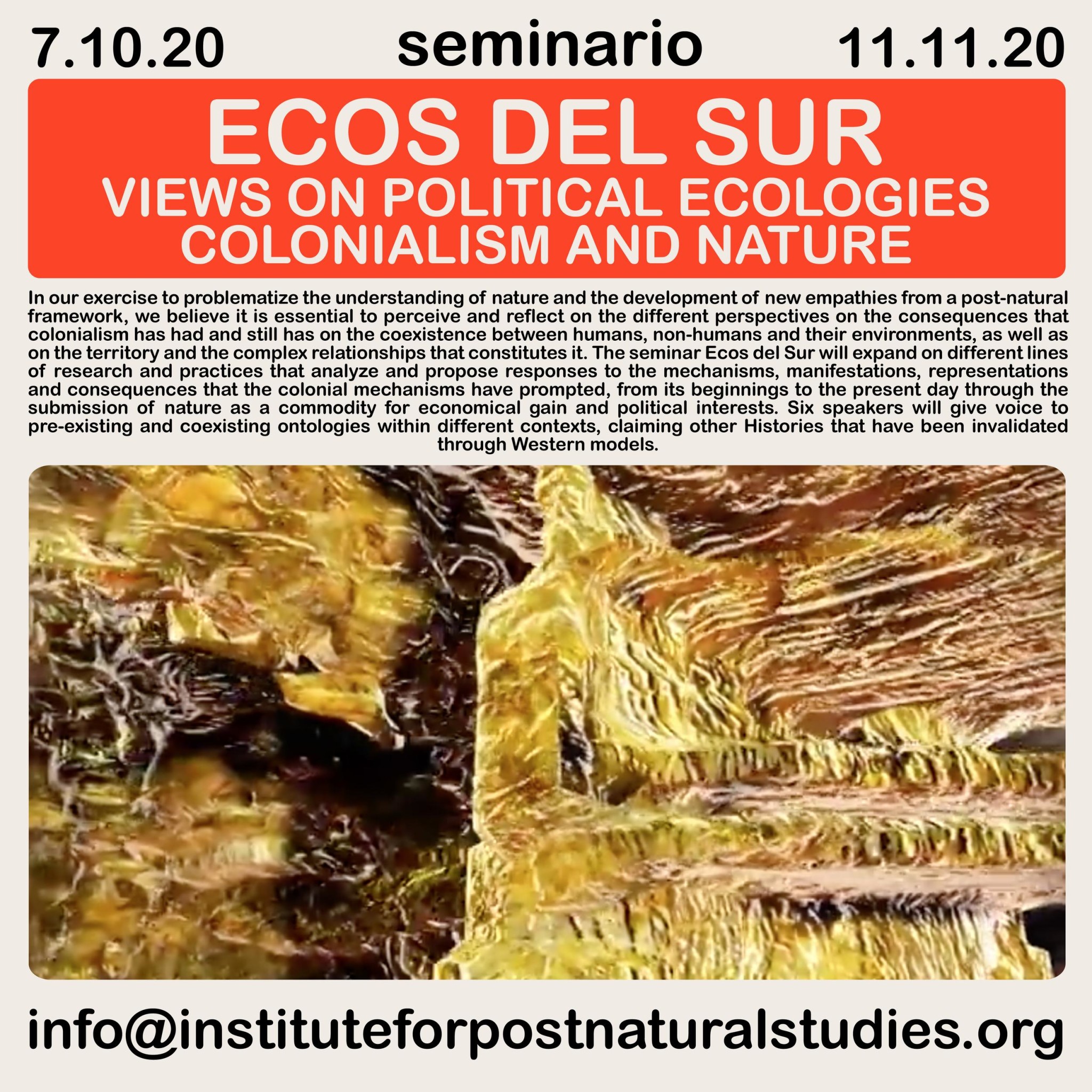Echoes of the South. Perspectives on Political Ecology, Colonialism and Nature
Nº of sessions
6 sessions
120 min each
Date
From Oct. 7th
To Nov. 11th
Time
From 19:00 to 21:00
(CET / CEST)
Language
English

From our approach to postnature, aiming to complexify the knowledge of the natural and the development of new empathies, we believe it is essential to know and reflect on the different perspectives on the consequences that colonialism has had and has had on the coexistence between humans, non-humans and their environments, as well as on the territory and the complex relationships that constitute it.
Brief
In the seminar Echoes from the South we will delve into research and practices that analyze and propose responses to the mechanisms, manifestations, representations and consequences that the colonial enterprise has provoked, from its beginnings to the present day, through the subjugation of nature as a commodity for the pursuit of its economic and political interests. Six authors will give voice to pre-existing and coexisting ontologies in different contexts, vindicating other histories that have been annulled through Western models.
Marisol de la Cadena, Susana Vargas, Azucena Castro, Paloma Contreras, Jonathan Castro, among other guests, will delve into issues ranging from the intervention between indigenous communities and the territory to the landscape transformations caused by extractivist practices, or the instrumentalization of natural elements for the imposition of other narratives. In each session, we will work together to deepen our understanding of nature as a cultural construction, providing us with tools that will help us to review, disarm and reformulate possible forms of nature-culture relationship through artistic practice.
Speakers
07 / 10 / 2020 -
Marisol de la Cadena
At the intersection between STS (Science and Technology Studies) and non-STS, Marisol develops her work through what she calls "ontological openings", interested in the study of politics, multispecies (or multi-entities), indigenism, history and the ahistorical, anthropologies of the world and anthropologies of worlds. In all these areas his concern is with the relationship between concepts and methods and with interfaces as analytical sites. More prosaically, he is interested in ethnographic concepts that blur the distinction between theory and the empirical because they are not exempt from the latter. Website here14 / 10 / 2020 -
Susana Vargas
Susana Vargas Cervantes writes, researches and teaches. Her work analyzes the connections between gender, sexuality, class and skin tones to reconceptualize the notion of pigmentocracy. She is the author of The Little Old Lady Killer: The Sensationalized Crimes of Mexico's First Female Serial Killer (NYU Press, 2019) and Mujercitos (Editorial RM, 2015). She holds a PhD in Art History and Communication Studies from McGill University in Montreal, Canada. She completed a postdoctoral fellowship at the Instituto de Investigaciones Estéticas and the Centro de Investigaciones sobre América del Norte at UNAM. After a Fulbright Visiting Fellowship at Columbia University, she joined the Department of Communication and Media at Carleton University. Website here21 / 10 / 2020 -
Azucena Castro
Azucena Castro has recently received her PhD from the Department of Romantic and Classical Studies at Stockholm University with her thesis "Strange Ecologies. Postnatural readings of Latin American extended poems of the 21st century (Roxana Miranda Rupailaf, Daniel Samoilovich and Luigi Amara)". Azucena holds an M.A. in Spanish-oriented media culture literature from Lund University, a B.A. in Education, English and English Literature from the University of Córdoba, Argentina. In her doctoral dissertation she examines, through a corpus of contemporary long poems, how these Latin American writers manifest the current postnatural condition. In her research she focuses on the assemblages between the human and the non-human, the organic and the non-organic and the articulations between life and matter from a postnatural paradigm situated in the extractive zones of Latin America Website here 28 / 10 / 2020 -Beatriz Santiago Muñoz
Beatriz Santiago Muñoz is an artist from San Juan, Puerto Rico. She works with the moving image with special attention to social structures and their relationship with aesthetics. Her works emerge from long periods of research, observation and documentation, in which the camera is present as an object with social implications and as a mediating instrument of aesthetic thought. The themes of his recent work have been politically charged: an artist accused of terrorism, post-military land, mega-factories, the relationship between artwork and labor, and a concrete poet/union leader. His work in film and video is always somewhere between performance and document, and at times it develops into a double existence. Website here04 / 11 / 2020 -
Paloma Contreras
Paloma Contreras Lomas lives and works in Mexico City and is part of the art collective Biquini Wax EPS. Through drawing, sculpture, performance, writing and multimedia installation, she addresses issues of gender, violence, political structure and inheritance, class segregation and post-colonialism. Using the landscape as a witness in his videos, and through the creation of costumes and characters with anthropological character, he achieves rural portraits through the Mexican thriller and explores the exoticization of the indigenous class, colonial guilt and the constructed identity of the middle class. Using research and the approach to certain groups or localities, his work contains affective ties and sometimes shows an autobiographical projection. Website here11 / 11 / 2020 -





